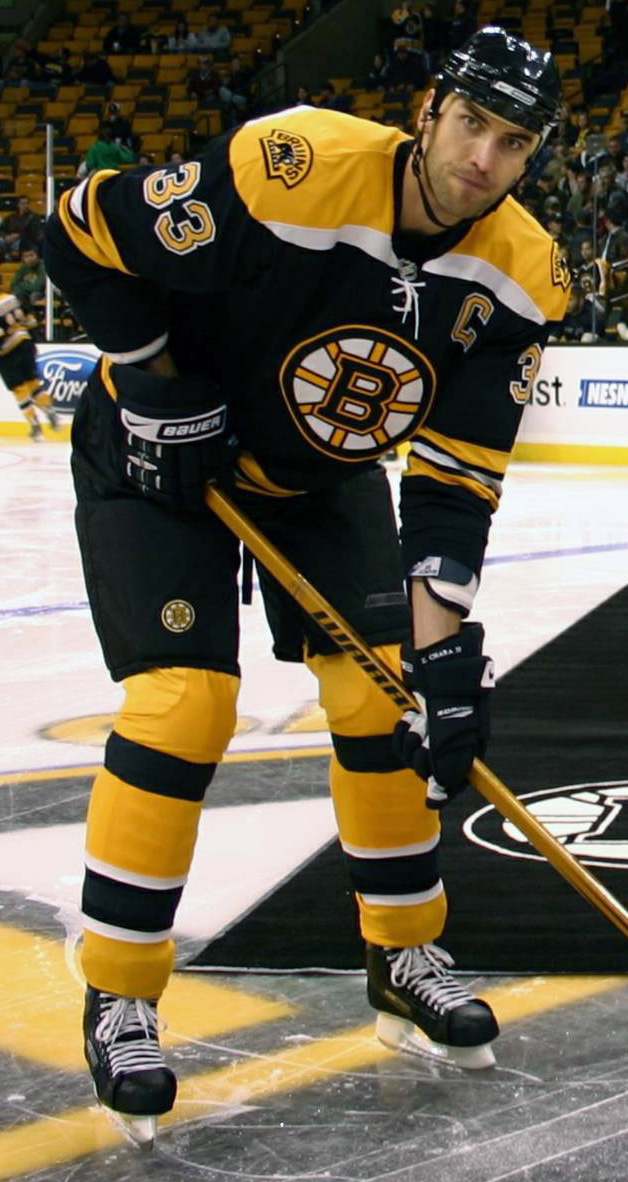Zdeno Chara, captain of the Boston Bruins hockey team, is not one to be messed with. A defenseman who reaches over 7 feet tall with skates on, Chara had to receive a NHL League waiver to use a special, longer stick that would actually fit his body. The refs don't let him fight often because once he starts, it takes a group effort to remove him from his opponent victim. For being such a fierce competitor on the ice, some may be surprised to find that off the ice, Chara is a philanthropist. Most recently, he is the Bruins spokesperson for the You Can Play Project, which supports LGBT athletes in sports. That's right ladies and gentlemen, if you want to be homophobic, you have to answer to Mr. Zdeno Chara! (...kind of. If only it were that easy to eradicate a homophobic culture in sports...)
The National Hockey League has become an enormous partner to the You Can Play Project. Each and every one of the league's 30 teams has a representative for the campaign. In other words, the league is 30 for 30 on making history.
The premise is simple, yet controversial: if you can play, you can play. Gay athletes and straight allies are banding together to send the message that homophobia cannot and will not be an accepted part of the culture of locker rooms and spectator areas.
Since its launch in March of 2012, the You Can Play Project (YCP), founded by Patrick Burke, Brian Kitts, and Glenn Witman, has been firing on all social media cylinders to promote their cause. Their Facebook page and Twitter handle have large followings respectively and continue to grow each day. But the real bread and butter of the YCP organization seems to be YouTube videos.
Consider the nine most recently uploaded videos on the You Can Play YouTube Channel:
The videos, all posted within the last month, show the breadth of supporters the campaign has:
- Denver Nuggets, professional basketball team
- Gabriel Landeskog, professional hockey player, Colorado Avalanches
- University of Missouri Athletic Department
- Jon Cornish, starting running back in the Canadian Football League
- FUN., that band with that song that will be stuck in your head for the rest of the day
And for the You Can Play Project, it's not entirely about using professional athletes and celebrities to get the word out about their initiative. This is as much of a grassroots effort as it is a celebrity promoted one (though The Sports Network in Canada just aired a three part series called ReOrientation that is truly remarkable). For the average non-professional-or-collegiate-athlete Joe or Jane, the You Can Play Twitter handle retweets and/or favorites anything that mentions @YouCanPlayTeam.
Want to make people feel like they're part of a movement? Connect on social media and favorite one of their tweets! They just might even be inspired to write a blog post about the organization...
Effecting change in cultural norms often happens at a glacial pace (...if it all...), so it would be unfair to expect that the You Can Play Project has the ability to fundamentally change the landscape and eradicate homophobia completely. What is fair to expect from this endeavor? Well, professional athletes are publicly addressing the topic of being gay and playing sports. Colleges and high schools are getting on board, too. Creating an organization that is inclusive of all humans is a key ingredient to culture change. Though some may argue that talk is cheap, I would argue that this is more than talk. Actions speak louder than words, and an organization that has an online store that features items in Russian is clearly not afraid to let Vladimir Putin know what's good, just in time for the Winter Olympics in Sochi, Russia. So take that, Putin: if you can play, you can play!



What a great blog Kayla! I look forward to following it:)
ReplyDeleteSusan
Thanks, Susan! :)
DeleteKayla, thank you for sharing such an interesting post! Homophobia is still a big problem in some countries. "If you can play, you can play" is a dream for many athletes in these countries. Russia, has banned any gay or lesbian athlete to attend the Olympic Games that is going to be held in Russia. Isn't it cruel? But being an ordinary person, what can you do to change the situation? Little. However, social media has the power. It can gather every ordinary person's little effect, to become a great effect and change something.
ReplyDeleteThis is truly an amazing movement, and a great example of how the groundswell is used to advocate for important human rights issues. As I was reading your blog, I was thinking about how great this is for American sports culture. Young girls and boys who are growing up looking up to these hockey players are seeing and hearing the message that they are spreading: "If you can play, you can play". As these young people start to find their place in the world, knowing that anybody can have an equal chance to make it as a pro athlete is such an important thing for them. Thanks for sharing this, Kayla. It seems as though this movement's presence on social media has taken it far and will continue to spread the message loud and proud. And I'm proud that one of Boston's finest is the frontrunner of this.
ReplyDelete